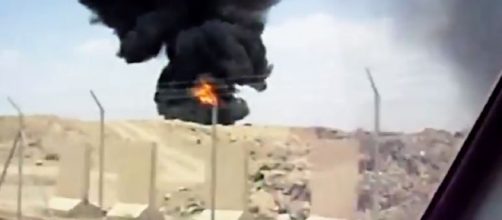I recently received a notice via email that the veterans' organization Burn Pits 360 will hold a lobby day in Washington, D.C. on June 7, and as a result would like to encourage participation by those who care for veteran causes.
Too often our veteran-centered charities focus on fluff rather than substance. For example, in D.C., there are organizations that may do good work in some areas but others focus on "respite events" such as cocktail parties where veterans, caregivers, and donors can mingle, in greater part to satisfy the needs the donors feel are necessary, rather than to meet the true needs of the stakeholders who require help.
These organizations (which shall remain nameless) do very little, if anything, to help the victims of toxic wounds, leaving the hard work of doing so to underfunded organizations like Burn Pits 360. Hopefully, this will change, and the planned lobby day will be part of that change.
Burn Pits 360' advocates and friends will be meeting on the morning of June 7 in the basement of the Cannon House office building, and from there will launch a campaign to advocate for the forgotten wounded. Stories of veterans impacted are being collected to develop a statement to submit to Congress.
Advocates will push for an acknowledgment of toxic exposure injuries, specialized healthcare, and appropriate disability benefits.
According to the email sent to me by Burn Pits 360, there will be a congressional meeting in Room 334 of the Cannon building that afternoon.
Please submit your story to Jen.latimer@burnpits360.org so we may include it in our congressional statement for the record. Deadline is Saturday.
— Burnpits360 (@Burnpit360) May 31, 2018
There is only one organization to help burn pit victims
Burn Pits 360 was founded by Rosie Torres and her husband Leroy Torres, himself the victim of toxic war wounds. They wanted to create a registry of veterans who developed strange illnesses after exposure to fumes from trash burning pits on military bases during the post-9/11 wars.
I have been at times associated with the organization and its efforts because my brother, Marine Corps Sergeant Thomas Joseph Sullivan, was himself exposed to burn pits in Iraq.
He developed an unusual cluster of symptoms, then passed away shortly after his military physicians told him his illness was psychosomatic.
He is by no means alone among veterans, and in my opinion, the Burn Pits 360 registry of the sick and deceased can prove it, even while the Department of Defense (DoD) and the Department of Veterans Affairs (VA) continue, in essence, to ignore or even cover up the problem of toxic wartime exposures. This is despite Fox news reporting in February that a court determined that it is linked to lung disease.
Our government resists the truth about burn pits
There have been many conspiracy theories over the years as to why DoD/VA would ignore complex wartime environmental and occupational illnesses.
When it comes down to it, the most rational explanation for the resistance is that these government agencies do not want to pay for disability benefits for the hundreds of thousands of Service Members and Veterans severely impacted by exposures such as burn pits.
The huge flaming trash pits were environmental disasters used to burn incredibly toxic materials. Any rational person would concede that the fumes emitted, when inhaled, could cause short and long-term health problems. Many private physicians and scientists have advanced this argument. But DoD/VA stick to the party-line that the connection between toxic exposure and the illnesses associated with toxic exposure which later emerges in veterans is not firmly established. That is why organizations like Burn Pits 360 are so important for the many suffering veterans who go without the support of a grateful nation.


